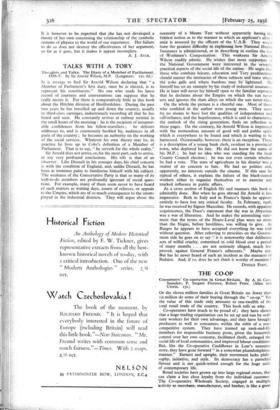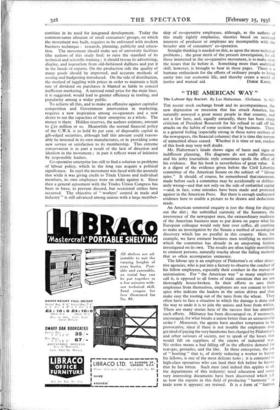THE CO-OP
Os the eleven million families in Great Britain no fewer than six million do some of their buying through the " co-op." Yet the value of this trade only amounts to one-twelfth of the total retail trade of the country. This book, tells us why.
Co-operators have much to be proud of ; they have shown that a huge trading organisation can be set up and run by ordi- nary workers for their own -advantage, and they have brought producers as well as consumers within the orbit of a non- competitive system. They have trained up rank-and-file members for responsible business posts, given the housewife control over her own economy, facilitated thrift, enlarged the social life of local communities, and improved labour conditions. Mit, like the Co-operative Cauliflower in Lear's nonsense story, they have gone forward " in a somewhat plumdomphious manner." Earnest and upright, their movement lacks philo- sophy, initiative, and style. Its democracy has a parochial flavour and is not , quick-witted enough for the huge scale of -contemporary life.
Retail societies have grown-up into large regional stores, that can claim a less close loyalty from the individual customer. The Co-operative Wholesale Society, engaged in multiple activity as merchant, manufacturer, and- banker, is-like a great
combine in its need for integrated development. Today the common-sense altruism of small consumers' groups, on which the movement was built, requires to be enlivened with modern business technique : research, planning, publicity and educa- tion. The movement should make use of university facilities (the authors of this study find) to raise the standard of its technical and scientific training ; it should rescue its advertising, display, and journalism from old-fashioned dullness and put it in the hands of experts. On the production side the quality of many goods should be improved, and accurate , methods of costing and budgetting introduced. On the side of distribution, the method of juggling with prices in order to maintain a high rate of dividend on purchases is blamed as liable to conceal inefficient marketing. A national retail price for the main lines, it is suggested, would lead to greater efficiency in trading, and popularity among a wider public.
To achieve all this, and to make an offensive against capitalist competition and Government intervention in marketing, requires a new inspiration among co-operators and a new desire to see the capacities of their enterprise as a whole. The money is there. Hidden reserves, the authors estimate, amount to L20 million or so. Meanwhile the normal financial policy of the C.W.S. is to hold 8o per cent. of disposable capital in gilt-edged securities, although half this amount could reason- ably be invested in its own manufactures, or in providing some new service or satisfaction to its membership. This extreme conservatism is in part a result of the lack of direction and idealism in the movement ; in part it reflects want of initiative by responsible leaders.
Co-operative enterprise has still to find a solution to problems of labour policy, which in the long run acquire a political significance. In 1926 the movement was faced with the anomaly that while it was giving credit to Trade Unions and individual members, its own employees were on strike against it. Since then a general agreement with the Trades Union Congress has been in force, to prevent discord, but occasional strikes have occurred. The objective of " workers' control in trade and industry " is still advanced among unions with a large member-
ship of co-operative employees, although, as the authors of this study rightly emphasise, theories based on sectional interests of producer or employee are incompatible with the broader aim of consumers' co-operation.
Straight thinking is needed on this, as upon the more technical problems ; the great merit of the present investigation, for all those interested in the co-operative movement, is to make clear the issues that lie before it. Something more than analytical skill, however, is brought to bear in these pages. There is a humane enthusiasm for the efforts of ordinary people to bring sanity into our economic life, and thereby create a world of

















































 Previous page
Previous page